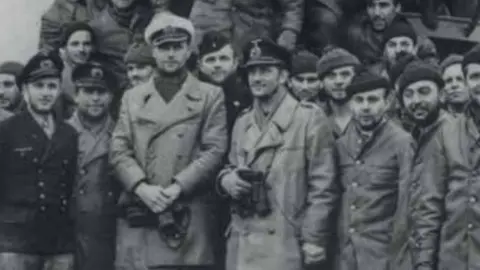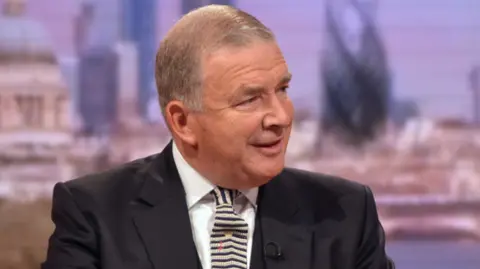Battle of the Atlantic: 'I was there when the Germans surrendered'
A "big announcement" came in the days that followed, he said.
"They announced the U-boats fighting at our end of the Atlantic were surrendering at Lisahally," he said.
On 14 May the first of the U-boats berthed at Lisahally and formally ordered to surrender by Admiral Sir Max Horton, commander-in-chief, Western Approaches.
"Of all the things that happened, all the things we had seen, this was the biggest of them all," Bert said.
"We were only young. All we thought was we had spent six years fighting the Germans, and now we were going to see actual real Germans," Bert said.

 Derry City and Strabane District Council Archive Collection
Derry City and Strabane District Council Archive Collection
Bert and his pals had to wait until "all the pomp died down".
"The first thing we heard was the singing of marching tunes.
"When we looked at them and I will never forget, they were all very young. Not many of them were even as old as 30.
"You could tell they were glad the war was over, they knew they had survived."
The German submariners were held at the naval base for about a year and Bert and his friends used to go down and look through the fence.
"One day they were all on their knees in a big line, we thought they were going to be shot," Bert said.
"What they were doing was pulling the grass out of the ground to make a football pitch – the next day a goalpost was put up.
"We spent time marching up and down with them. They made us toys at Christmas, they made a toy double decker bus – I had never seen a double decker bus."


Derry's strategic importance can not be underestimated, Admiral Lord West of Spithead, the First Sea Lord and Chief of the Naval Staff from 2002 to 2006, said.
"It was absolutely crucial and we needed to get our ships and facilities as far to the west as we could," he told BBC Radio Ulster's Good Morning Ulster programme.
"It was wonderful that we could use the base up in Londonderry which put our ships a bit closer."
The U-boats were deliberately sunk - or scuttled - off the coast of Derry and Donegal after the war.
A special event to commemorate the city's wartime role is set to take place in Derry's Ebrington Square on 17 May.












:max_bytes(150000):strip_icc()/GettyImages-1055159816-a0121951cbdd473caad51f3aa25617a7.jpg)
